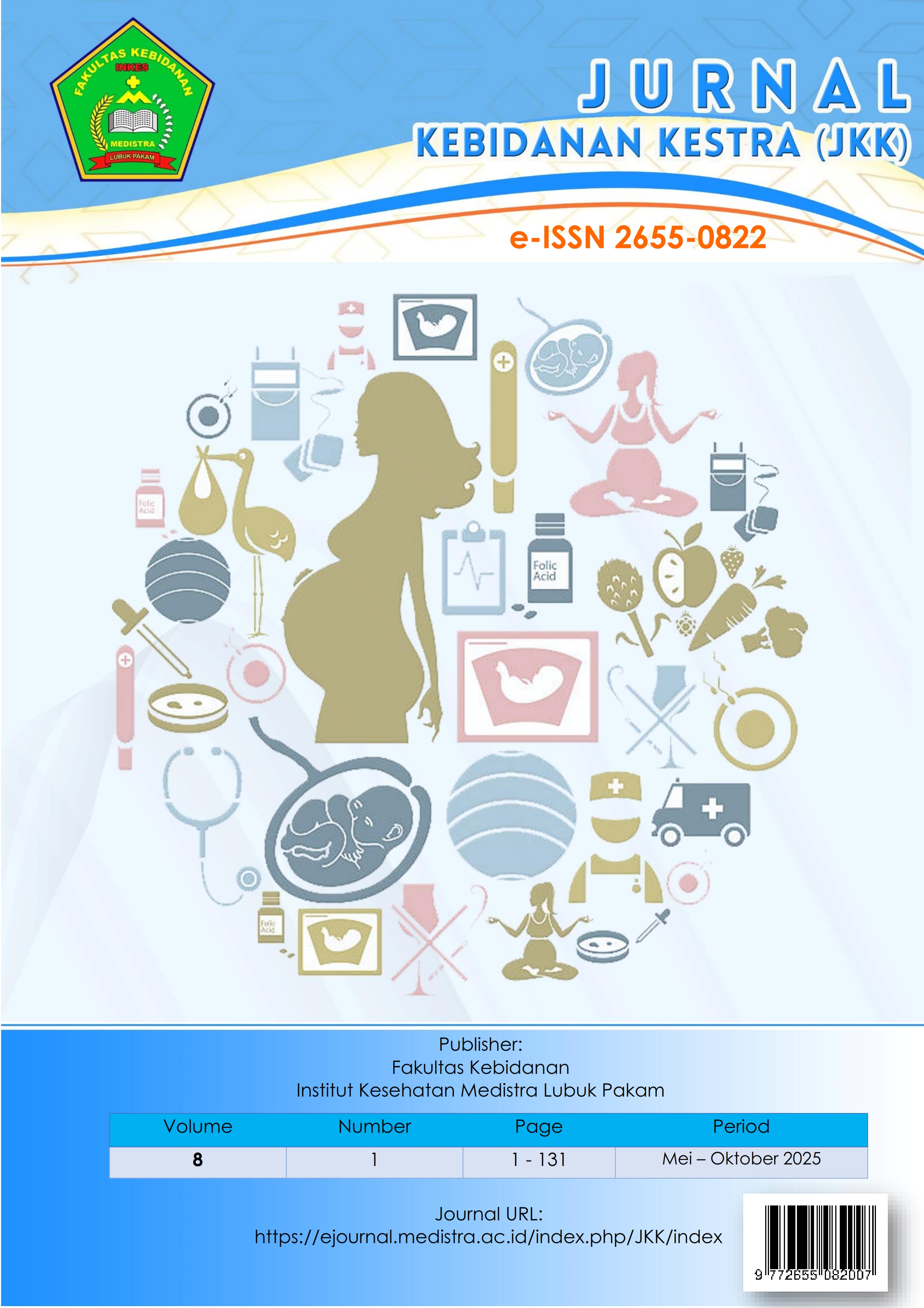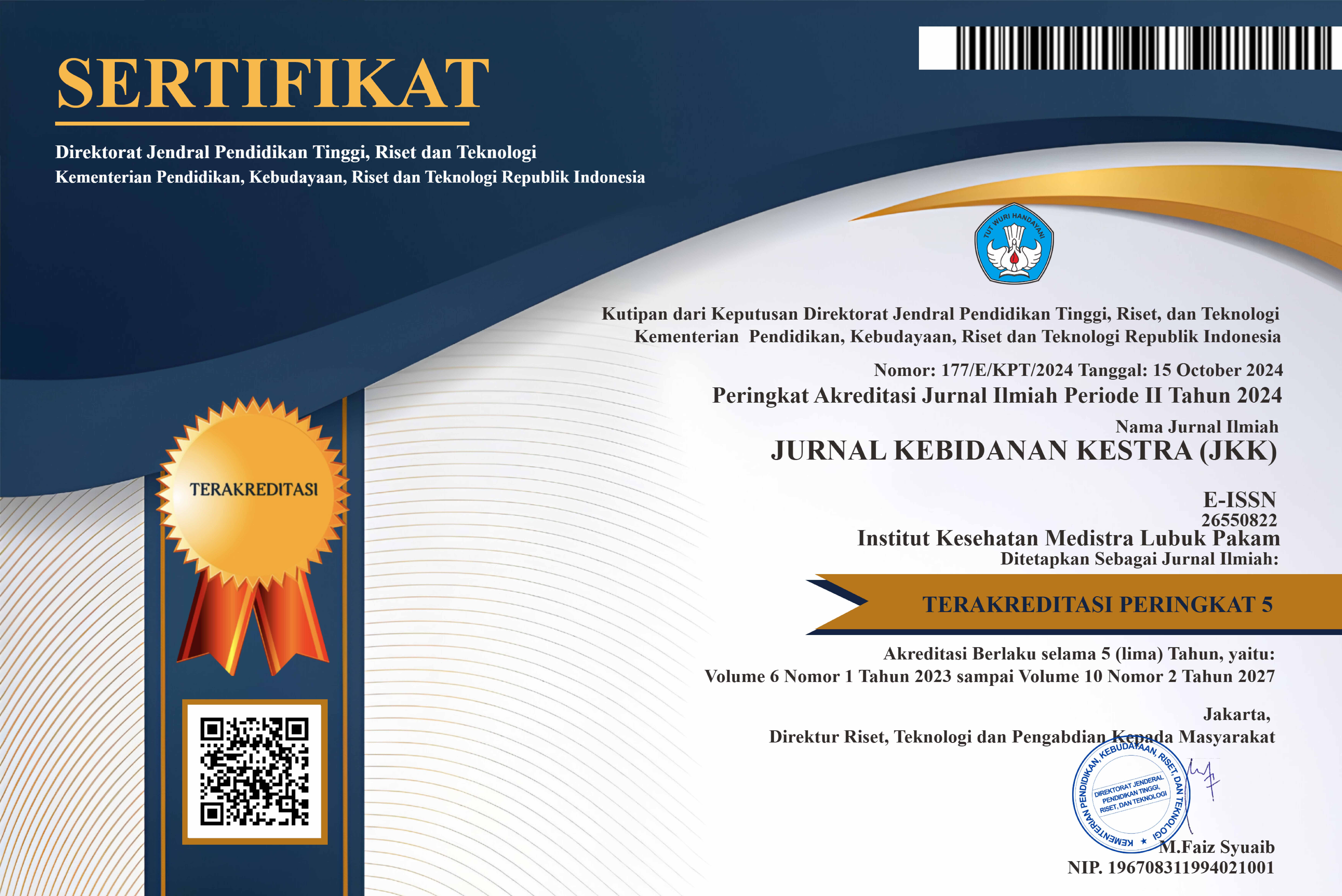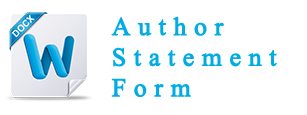The Effect of Progressive Muscle Relaxation on Fear of Childbirth in Primigravida Mothers
DOI:
https://doi.org/10.35451/3mcbpw15Keywords:
muscle progress relaxation; fear; childbirth; primigravida mothersAbstract
Pregnancy and childbirth are extraordinary physiological experiences but can also be a source of psychological stress for women, especially for primigravidas who have no previous experience. Fear of childbirth often arises from uncertainty about pain management, concerns about the fetus's condition, and a lack of adequate information. This condition results in increased stress, sleep disturbances, and even mild depression, which can affect the mother's physical and mental readiness for childbirth. This study aims to analyze the effect of progressive muscle relaxation on fear of childbirth in primigravida mothers. The type of research used is an experimental study with a pretest-posttest without a control group. The sample consisted of third-trimester primigravida pregnant women who met the inclusion criteria, using a purposive sampling technique. The intervention in the form of progressive muscle relaxation exercises was given for 2 weeks at a frequency of three times per week and independent practice at home. The research instruments used were the Wijma Delivery Expectancy/Experience Questionnaire (W-DEQ), a demographic and obstetric history questionnaire, and a compliance sheet. Data analysis used dependent and independent t-tests. The results showed a significant decrease in fear of childbirth scores after progressive muscle relaxation with a p-value of 0.001. In conclusion, progressive muscle relaxation training is effective in improving the physical and psychological readiness of primigravida mothers for childbirth. This study recommends that health workers, particularly midwives, integrate progressive muscle relaxation training as a non-pharmacological intervention in prenatal classes.
Downloads
References
[1] Hoffmann L, Banse R. Psychological aspects of childbirth: Evidence for a birth-related mindset. Eur J Soc Psychol. 2021 Feb 1;51(1):124–51.
[2] Aguilera-Martín Á, Gálvez-Lara M, Blanco-Ruiz M, García-Torres F. Psychological, educational, and alternative interventions for reducing fear of childbirth in pregnant women: A systematic review. Vol. 77, Journal of Clinical Psychology. John Wiley and Sons Inc; 2021. p. 525–55.
[3] Suryani L, Kamil H, Hasanuddin H, Yahya M, Sulastri S. The Emotional Journey: An Exploration of Women’s Pre-Birth Anxieties. Heca Journal of Applied Sciences. 2024 Jun 25;2(2):46–53.
[4] Lundborg L, Åberg K, Liu X, Norman M, Stephansson O, Pettersson K, et al. Midwifery Continuity of Care During Pregnancy, Birth, and the Postpartum Period: A Matched Cohort Study. Birth. 2025 Mar 1;52(1):146–56.
[5] KAYA L, BİLGE Y, KELES E, ERKOK U, KAYA Z. Effect of Antenatal Education on Fear of Childbirth, Mental Health, and Perceived Stress in Primiparous Pregnant Women: A Prospective Randomized Controlled Trial [Internet]. 2025. Available from:https://www.researchsquare.com /article/rs-7041181/v1
[6] Zhang T, Liu M, Min F, Wei W, Liu Y, Tong J, et al. Fear of childbirth and its determinants in pregnant women in the third trimester: a cross-sectional study. BMC Psychiatry. 2023 Dec 1;23(1).
[7] Alizadeh-Dibazari Z, Maghalain M, Mirghafourvand M. The effect of non-pharmacological prenatal interventions on fear of childbirth: an overview of systematic reviews and meta-analysis. BMC Psychiatry. 2024 Dec 1;24(1).
[8] Abera M, Hanlon C, Daniel B, Tesfaye M, Workicho A, Girma T, et al. Effects of relaxation interventions during pregnancy on maternal mental health, and pregnancy and newborn outcomes: A systematic review and meta-analysis. Vol. 19, PLoS ONE. Public Library of Science; 2024.
[9] Anuhgera DE, Siregar WW, Ritonga NJ, Pardede D. TERAPI ALTERNATIF PENGURANGAN RASA NYERI DAN KECEMASAN MELALUI SLOW STROKE BACK MASSAGE (SSBM) PADA INPARTU KALA I FASE AKTIF. JURNAL KEBIDANAN KESTRA (JKK). 2020 Apr 30;2(2):211–8.
[10] Rajeswari S, Sanjeevareddy N. Efficacy of progressive muscle relaxation on pregnancy outcome among anxious indian primi mothers. Iran J Nurs Midwifery Res. 2020 Jan 1;25(1):23–30.
[11] Rahimi F, Moeni Mehr M. Effect of Different Relaxation Methods on Pregnancy and Childbirth: a Systematic Review. Journal of Shahid Sadoughi University of Medical Sciences. 2021 Apr 26;
[12] Laila Astuti Y, Kao CH, Kebidanan J, Kesehatan Kemenkes Jakarta PI, Naskah G, Kunci K. PENERJEMAHAN DAN VALIDASI INSTRUMEN TAKUT MELAHIRKAN KE DALAM BAHASA INDONESIA: W-DEQ VERSI A Info Artikel Abstrak TRANSLATION AND VALIDATION OF FEAR OF CHILDBITH INTO BAHASA: THE W-DEQ A VERSION.
[13] Ghorbannejad S, MehdizadehTourzani Z, Kabir K, MansourehYazdkhasti. The effectiveness of Jacobson’s progressive muscle relaxation technique on maternal, fetal and neonatal outcomes in women with non-severe preeclampsia: a randomized clinical trial. Heliyon. 2022 Jun 1;8(6).
[14] Carmen B, Gerlind G. Citation: Carmen B, Gerlind G (2021) Systematic Review on the Efficacy of Interventions for Fear of Childbirth, Anxiety and Fear in Pregnant Women. Inno Journal of Applied Microbiological Research Journal of Pediatrics and Infants. 2021;4(2):66–90.
[15] Hajihatamloo H, Ebrahimi M, Alinejad V, Bayrami R. Anxiety, self-compassion, perceived social support and resilience in two groups of primiparous pregnant women fully and not attending childbirth preparation classes. BMC Psychol. 2025 Dec 1;13(1).
[16] Gaeini S, Sotoodeh Asl N, Professor A. Comparison of the Effectiveness of Behavioral Activation and Relaxation on Reducing Anxiety and Fear of Childbirth in Primiparous Women of Karaj City [Internet]. Vol. 29, Razi Journal of Medical Sciences. 2023. Available from: http://rjms.iums.ac.ir
[17] O’Connell MA, Khashan AS, Leahy-Warren P, Stewart F, O’Neill SM. Interventions for fear of childbirth including tocophobia. Cochrane Database of Systematic Reviews. 2021 Jul 7;2021(7).
[18] Huang Y, Zhong Y, Chen Q, Zhou J, Fu B, Deng Y, et al. A comparison of childbirth self-efficacy, fear of childbirth, and labor pain intensity between primiparas and multiparas during the latent phase of labor: a cross-sectional study. BMC Pregnancy Childbirth. 2024 Dec 1;24(1).
[19] Veringa-Skiba IK, Ziemer K, de Bruin EI, de Bruin EJ, Bögels SM. Mindful awareness as a mechanism of change for natural childbirth in pregnant women with high fear of childbirth: a randomised controlled trial. BMC Pregnancy Childbirth. 2022 Dec 1;22(1).
[20] Zhou J, Zhu Z, Li R, Guo X, Li D. Comparative efficacy of non-pharmacological interventions on fear of childbirth for pregnant women: a systematic review and network meta-analysis. Front Psychol. 2025;16(March):1–12.
[21] Anuhgera DE, Jalilah N, Sitorus R, Dwi Handayani, Debi Dinha Octora. The Effect of Progressive Muscle Relaxation on Low Back Pain And Anxiety in Primiparas. JURNAL KEPERAWATAN DAN FISIOTERAPI (JKF) [Internet]. 2025 Apr 30;7(2):142–50. Available from: https://ejournal.medistra.ac.id/index.php/JKF/article/view/2379
[22] Beddig T, Timm C, Ubl-Rachota B, Zamoscik V, Ebner-Priemer U, Reinhard I, et al. Mindfulness-based focused attention training versus progressive muscle relaxation in remitted depressed patients: Effects on salivary cortisol and associations with subjective improvements in daily life. Psychoneuroendocrinology. 2020 Mar 1;113.
[23] Amdadi ZA, Mukarramah S, Ahmad M. International Journal of Science and Environment The Effect of Hydrotherapy and Progressive Muscle Relaxation (PMR) on Cortisol Levels in Primigravida Pregnant Women [Internet]. Available from: https://ijhp.net
Downloads
Published
Issue
Section
License
Copyright (c) 2025 Diah Evawanna Anuhgera, Yohana Putri Apryanti, Lidia Lushinta

This work is licensed under a Creative Commons Attribution 4.0 International License.
Copyright in each article is the property of the Author.



























